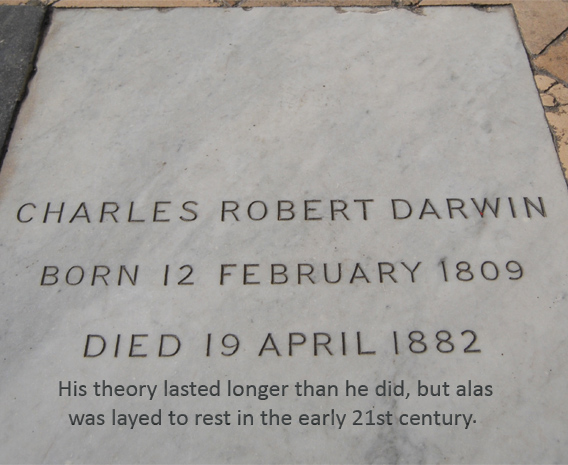Darwin’s Theory is Dying
Darwin’s Evolutionary Theory is Dying..
And it’s because of what science is discovering that finally, Darwin’s greatest doubt is being realised.
“If it could be demonstrated that any complex organ existed, which could not possibly have been formed by numerous, successive, slight modifications, my theory would absolutely break down.” – Charles Darwin, 1859.
Let’s first let us define what evolution is before we can say it is a theory that is dying. Darwinism is “the process by which different kinds of living organism are believed to have developed from earlier forms during the history of the earth.”

So, given enough time the simplest organisms such as bacteria can change into the most complex (like you and me) due to mutations and natural selection. For anything to be of any advantage to any organism it has to work, and for it to work all the bits need to be in place. For a cell to be a cell it has to have all its components. For me to be me I need my liver, my stomach, my brain to all be functioning together at the same time.
Before I move on it is also necessary to define adaptation: “the process of change by which an organism or species becomes better suited to its environment.”
Adaptation is often referred to as ‘micro evolution’. The term is a little misleading because it implies that enough of this micro evolution would lead to the ‘macro evolution’ turning one type of organism into another. There is no doubt organisms adapt: the evidence is abundant. However, there is no evidence that one organism turns into another. A dog remains a dog, a fly a fly, a cat a cat etc. Whilst there’s huge variability within each type (long hair, short hair, long beaks, short beaks etc ) which accounts for how that variability leads to a functional benefit (e.g keeping warm in colder climates), types of animals are restricted in how much change can take place by a ‘body plan’, the origin of which is still a mystery.
Whilst confirmation of this is abundantly evident by simply looking around us, evolutionist often see historical fossil evidence as the key to observing this transitional change. However, despite the abundance of fossils throughout the world the transitional evidence is virtually non-existent. It does not show one type of animal turning into another, but rather it shows complete organisms rapidly coming onto the scene without any antecedent, only changing with what you would expect adaptation to show, then coming to an end when extinction occurred.
In essence, this is all quite obvious. However, what is interesting is how so many people are stuck with interpreting evidence in one particular way, however absurd this becomes. It’s a bit like insisting that iPhones came about when Steve Jobs added a load of metals and silicon into a mixing bowl, popped it in the oven and went to bed. In the morning, there was the iPhone.
And this is really at the heart of the origins debate – being stuck with one particular worldview and clinging onto it no matter what. As Chalmers pointed out in his book ‘So what is this thing called Science?’ people cling on to their beliefs for dear life despite the evidence clearly pointing them in a different direction, defending it at all costs using any method available, until finally it falls apart under the weight of evidence then finally they may let go.
That’s what is happening with Darwinian evolution. The weight of evidence that has been accumulated particularly over the last 20 years is overwhelming. There are hundreds of examples of where ‘numerous, successive, slight modifications’ cannot explain their existence and therefore in Darwin’s own words, his theory ‘absolutely breaks down’.
